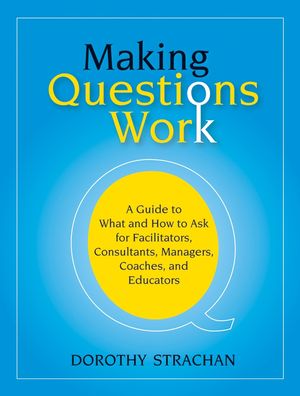Making Questions Work: A Guide to How and What to Ask for Facilitators, Consultants, Managers, Coaches, and EducatorsISBN: 978-0-7879-8727-5
Paperback
272 pages
November 2006, Jossey-Bass
 This is a Print-on-Demand title. It will be printed specifically to fill your order. Please allow an additional 10-15 days delivery time. The book is not returnable.
|
||||||
The Author.
Preface.
Introduction.
PART ONE: HOW TO ASK QUESTIONS.
1 Questions That Work.
PROCESS FRAMEWORKS.
CONSCIOUS QUESTIONING.
Framing Questions.
Planned Questioning.
Closed and Open Questions.
Closed Questions.
Open Questions.
SKILLS FOR CONSCIOUS QUESTIONING.
Customize for Context.
Create Inviting Questions.
Clarify Assumptions.
Ask with Sensitivity.
Accommodate Risk and Anxiety.
Maintain a Participant-Observer Stance.
Consider “Why?” Carefully.
When in Doubt.
REMINDERS.
2 Core Facilitation Values.
VALUES INTO ACTION.
INTEGRITY.
Guidelines for Asking Questions with Integrity.
Maintain Objectivity.
Clarify Confidentiality.
Be Sensitive to Conflicts of Interest.
Avoid Collusion.
Ask Questions Fairly.
Determine Authorship.
Address Imbalances in Power and Information.
Operationalizing the Value of Integrity.
AUTHENTICITY.
Guidelines for Asking Questions with Authenticity.
Build Group Ownership for Outcomes.
Minimize Self-Deception About a Process.
Be Clear About Intentions.
Acknowledge Problems.
Be Honest About Your Competencies.
Be Present; Tune In.
Hear Your Client’s Perspective.
Operationalizing the Value of Authenticity.
MUTUAL RESPECT.
Guidelines for Asking Questions with Mutual Respect.
Enable Equity.
Clarify Group Norms.
Respect Exchange Times.
Encourage Direct Interaction.
Be Patient; Whose Silence Is It?
Respect the Energy in the Group.
Operationalizing the Value of Mutual Respect.
LEANING ON VALUES.
3 Follow-up Questions.
PROMPT FOR CLARIFICATION.
PROMPT FOR PERSPECTIVES.
PROMPT FOR RATIONALE.
PROMPT FOR OPTIONS.
PROMPT FOR IMPLICATIONS.
PART TWO: WHAT TO ASK WHEN.
4 Questions for Opening a Session.
PROCESS FRAMEWORK.
GUIDELINES FOR QUESTIONS TO OPEN A SESSION.
QUESTION BANK.
Getting to Know One Another.
Focus: Sharing Personal Information.
Focus: Exploring Work Experience.
Clarifying Expectations.
Focus: Understanding Hopes and Concerns.
Focus: Meeting Objectives and Outcomes.
Building Commitment.
Focus: Developing Group Norms.
Focus: Building Ownership.
COMMON CHALLENGES.
When Time Is Short.
Opening a Workshop on a Specific Topic.
Opening a Series of Workshops.
Loosening Up a Tight Group.
5 Questions for Enabling Action.
PROCESS FRAMEWORK.
GUIDELINES FOR QUESTIONS TO ENABLE ACTION.
QUESTION BANK.
“What?”: The Notice Questions (Observations).
“So What?”: The Meaning Questions (Reflections).
Focus: Relevance and Fit.
Focus: The Organization.
Focus: The Individual.
“Now What?”: The Application Questions (Actions).
Focus: Personal Change.
Focus: Organizational Change.
Focus: Building Ownership.
Focus: Operational Planning.
COMMON CHALLENGES.
Supporting Action After a Meeting of a Network or Coalition.
Enabling a Structured Approach to Reflection and Action.
Discussing and Making Decisions That Affect Organizational Policies.
Applying Research (Knowledge Translation).
Workplace Stress: Personal Change.
6 Questions for Thinking Critically.
PROCESS FRAMEWORK.
GUIDELINES FOR QUESTIONS TO ENABLE CRITICAL THINKING.
QUESTION BANK.
Making Assumptions and Perspectives Explicit.
Focus: The Individual.
Focus: The Team or Organization.
Focus: The Broader Context.
Understanding Interests and Power Relationships.
Focus: The Individual.
Focus: The Team or Organization.
Focus: The Broader Context.
Exploring Alternative Ways of Thinking and Acting.
Focus: The Individual.
Focus: The Team or Organization.
Focus: The Broader Context.
Making Ethical Choices.
Focus: The Individual.
Focus: The Team or Organization.
Focus: The Broader Contex.
COMMON CHALLENGES.
Thinking Critically About the Future.
Acting Ethically in Low-Resource Countries.
Thinking Critically About Policy Changes.
7 Questions for Addressing Issues.
PROCESS FRAMEWORK.
GUIDELINES FOR QUESTIONS TO ADDRESS ISSUES.
QUESTION BANK.
Understanding the Situation.
Focus: Internal Considerations.
Focus: External Considerations.
Clarifying the Issues.
Focus: Issue Description.
Focus: Why This Is an Issue.
Focus: Stakeholders.
Generating Options for Action.
Focus: A Positive Future.
Focus: Solutions.
Focus: Learning from Others.
Testing Options for Action.
Focus: Rationale.
Focus: Potential Impact.
Focus: Strategic Fit.
Making a Decision.
Taking Action.
COMMON CHALLENGES.
Encouraging Candor and Confidentiality.
Putting Sensitive Issues on the Table.
Issues Management in a Nongovernmental Organization.
Issues-Based Planning: A Redundancy Program.
8 Questions for Closing a Session.
PROCESS FRAMEWORK.
GUIDELINES FOR QUESTIONS TO CLOSE A SESSION.
QUESTION BANK.
Looking Backward.
Focus: Midway Through a Process.
Focus: The Experience as a Whole.
Focus: Learning.
Focus: Productivity.
Focus: Management of the Process.
Looking Forward.
Focus: Celebrating Success.
Focus: Building Ownership for Follow-Through.
Focus: Taking Action—Knowledge Translation.
Focus: Future Collaboration.
COMMON CHALLENGES.
Bringing a Multisite Project to a Close.
Closing a National Issues-Based Workshop.
Conducting Exit Interviews in Small Groups.
Reviewing a Pilot Workshop.
In Closing: About Questions—What I Know for Sure.
References.



